Kingdom Come: Deliverance Review
February 16, 2018 | 18:30
Companies: #deep-silver #warhorse-studios
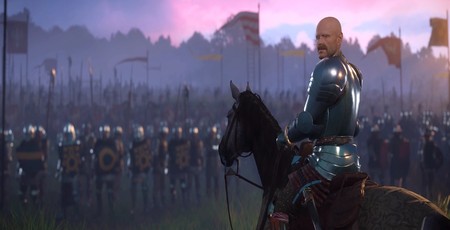
Price: £39.99
Developer: Warhorse Studios
Publisher: Deep Silver
Platform(s): PC, PS4, Xbox One
Version Reviewed: PC
I spent a long time trying to pin down an example from Kingdom Come: Deliverance that best sums up my time with it. I considered starting with the time I raided a bandit-camp single-handed, to explain the game's gruelling medieval combat. But then I thought instead I should tell you about how I went searching for a group of heretics, to describe its interesting approach to quest design. Then I changed my mind, and started writing about when I sneaked into the bath-house with a local lord for a night of drinking and mischief, as an introduction to its more characterful moments. Not long after this I got stuck on a boss fight for two hours, and so figured I should start by writing about how damned unbalanced and unforgiving this game can be.
The problem is none of these examples epitomise the game on their own. Only when they're explained together do you get some sense of what playing Kingdom Come: Deliverance is like. It's a massive, cavernously deep, and hugely varied RPG, one that's in many ways thoughtfully designed and also possesses a surprising amount of heart. At the same time, however, it's wonky as hell and, at times, enormously frustrating to play.
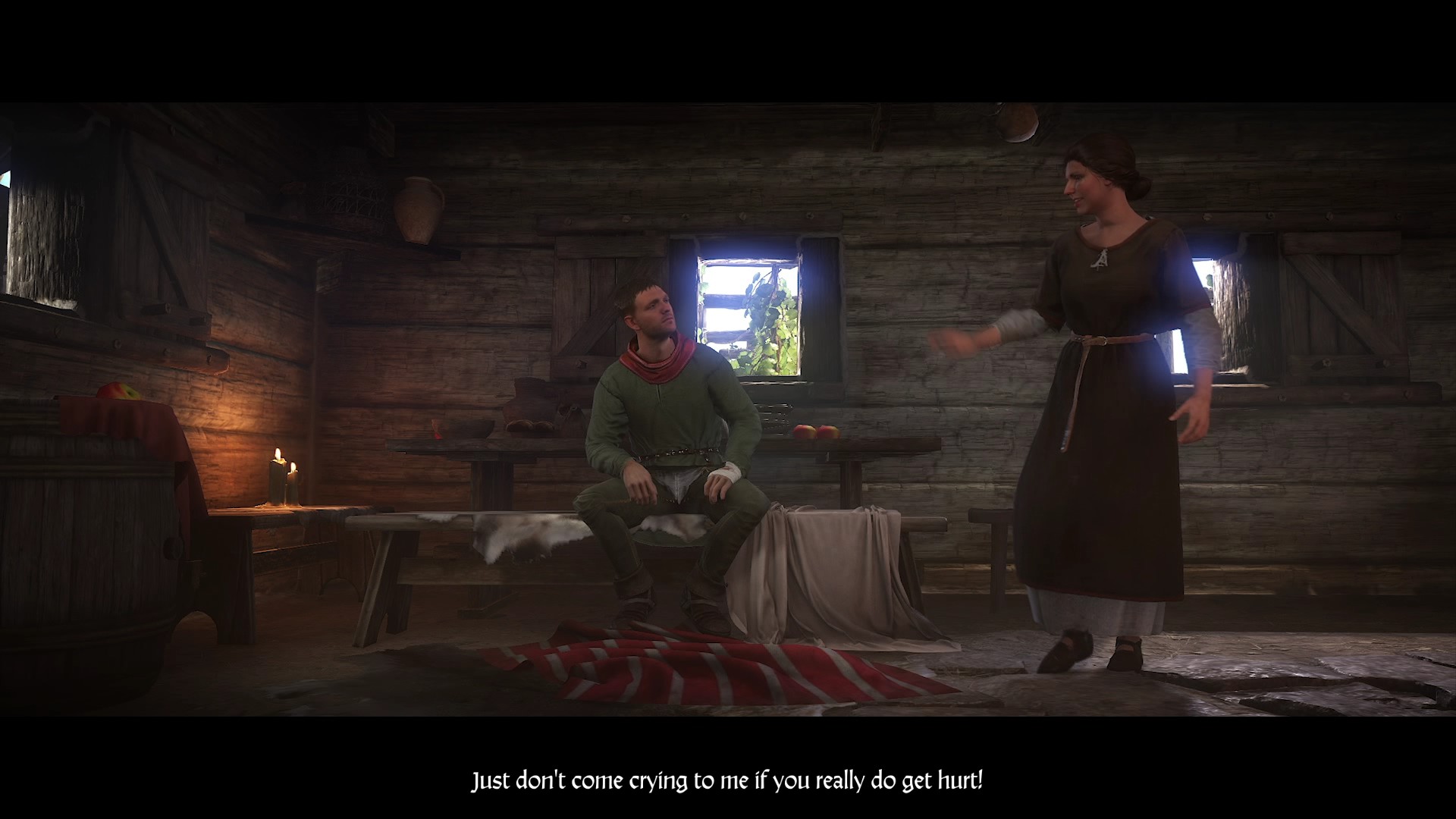
Deliverance's story centres around Henry of Skalitz, a blacksmith's son on a quest for revenge after his parents are murdered and his village burned down by the army of Lord Sigismund, a pretender to the throne of the Kingdom of Bohemia. The setting is staunchly medieval, meaning you won't find any orcs roaming the land or wizards studying arcane arts in high-towers (although the game does allow you to dabble in some alchemy if you choose).
Given both the setting and the basic premise of the plot, Deliverance's tale could easily have been a brooding, grimdark thing. Certainly, it doesn't shy away from the harshness of life and often horrific brutality that came to define the era. On your journey you'll contend with war and plague, cruel nobles and fanatical vicars. But Deliverance also finds time to show us warmth and humour, honour and chivalry, while treating many of its characters with a sympathetic eye. You'll court ladies, attend feasts and tournaments, and get stinking drunk in a church tower with a dodgy priest.
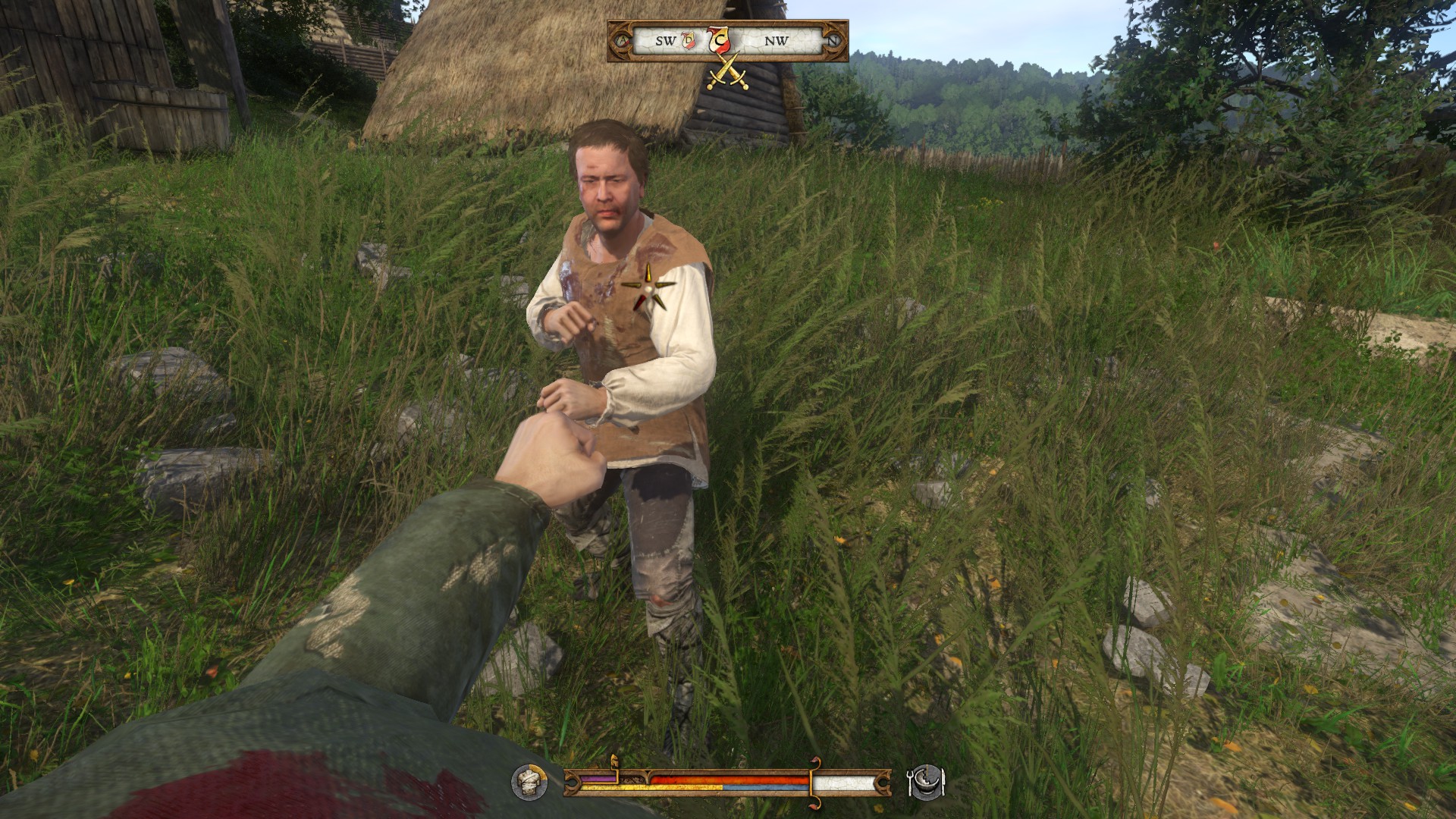
Henry is also no Geralt of Rivia, and I mean this in a good way. He's young, ambitious, and generally upbeat, even after the terrible things he's witnessed. He's also a bit laddish and more than a little naïve. Primarily, though, he comes to this world as we do, with little experience of how it truly works, and as he learns about it so do we. Henry sets Deliverance apart from many other RPGs. He wasn't destined for greatness, wasn't apprenticed to a master swordsman or imbued with some innate power. He rises in stature through a lot of hard work and a little bit of luck, and often seems as surprised at where his journey takes him as we are.
The actual plot mainly serves to move Henry about the map and offer ever greater challenges for him to overcome. Not that you'll need much encouragement to do either. Deliverance's visual representation of medieval life is lavish. The sprawling, grassy countryside is dotted with babbling rivers, quaint farmsteads, verdant forests, and smoky peasant villages. The towns and cities, meanwhile, are bustling, dirty, and wildly colourful. Often they'll have a castle at the centre, and some, like Rattay, are entirely fortified.
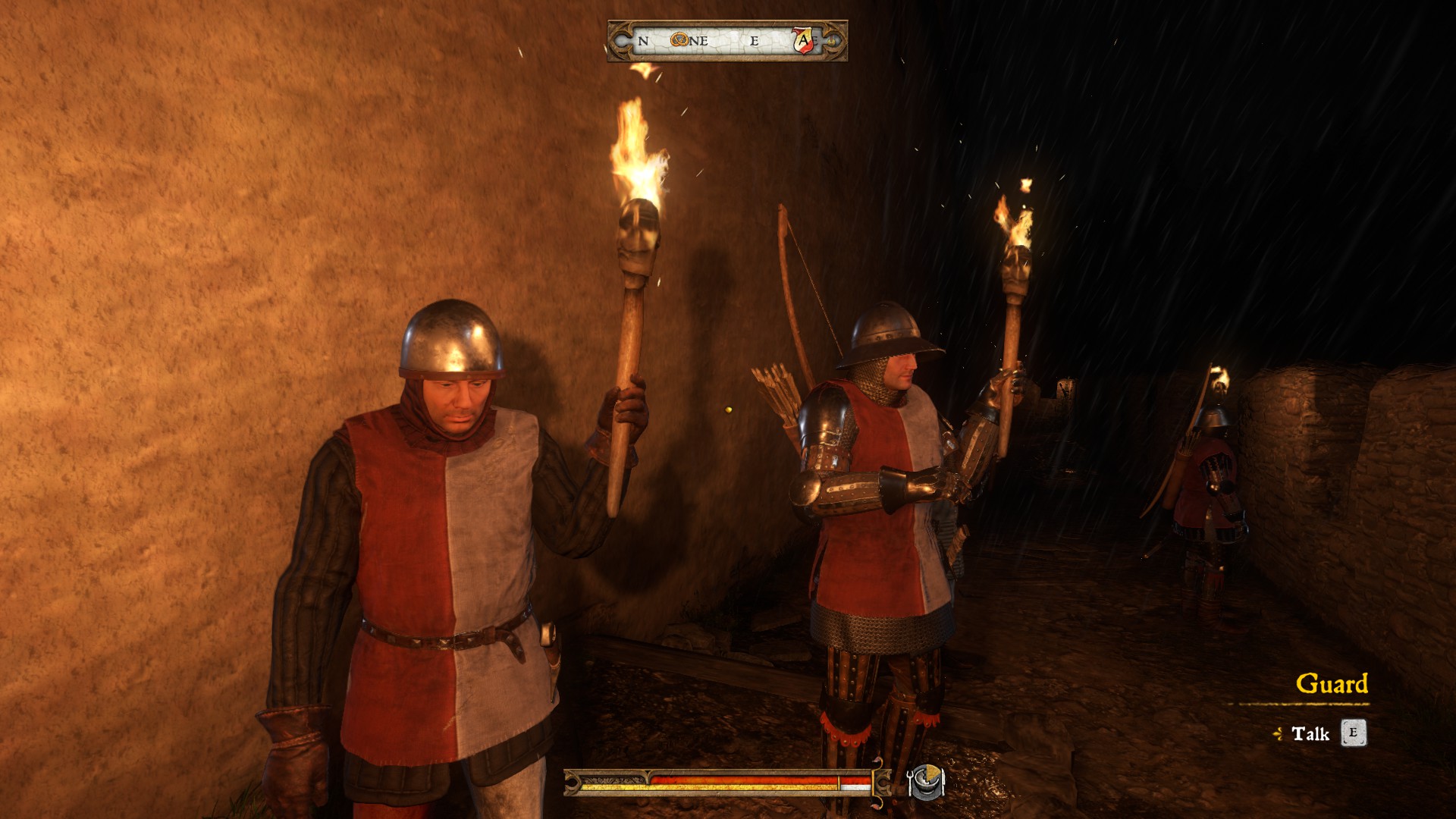
The world is a treat to explore, with loads of interesting sights and hidden secrets to discover. More impressive than the landscape itself, however, is the simulation of the medieval society. Almost every NPC in the game has a routine that they follow. Traders' stalls and blacksmith's forges are only open at certain times, and if you roll-up on a quest-giver at midnight, there's a good chance you'll find them sound asleep with the door to their house locked. Deliverance's medieval machine is also highly reactive to Henry's presence. His reputation in individual towns will affect how people treat him there, as will the type of clothes he's wearing and the condition they're in. The simulation affects play, too; Henry needs to eat and sleep fairly regularly, and wearing darkly coloured, lightweight clothes is better for sneaking around than a full suit of armour.
A similar level of depth is attributed to quests, many of which are lengthy and multilayered. Some side-quests will take a good couple of hours to resolve, while the third act of the main story is basically one massive quest that sees you on the trail of a group of bandits who raided a nearby village. Kingdom Come also doesn't like to hold your hand too much when tracking down an objective. Rather than pointing you exactly to where the next part of a quest lies, it'll give you a set area to explore, or you'll have to get directions from an NPC or a book.
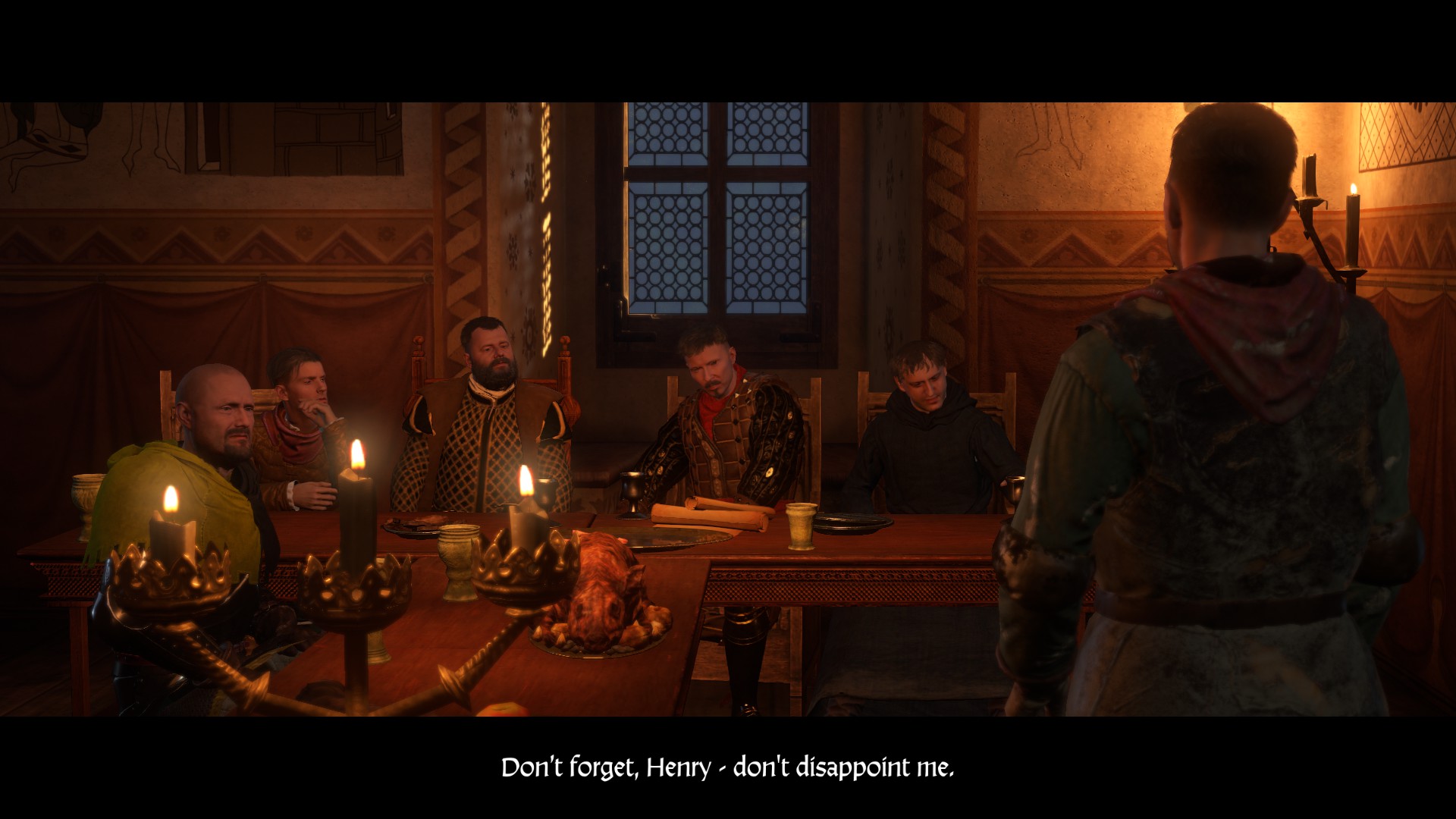
This is one of Kingdom Come's features that can satisfy but also frustrate. In one example, I had to find a lost horse by asking wayfarers if they'd seen the horse pass in that direction, far more interesting that just following a breadcrumb trail on the map. In another, however, I was given some verbal pointers to a bandit camp, but when I arrived at the camp, the bandits weren't there, and the game offered no indication I was in the right spot. I spent a good half-hour searching the woods for them, only to return to the same camp to find that they had since returned.
Still, the variety of quests on offer is impressive, as is the range of ways you can complete them. Most situations can be resolved through dialogue or combat, and a fair number allow you to employ stealth and thievery too. Deliverance also caters to developing certain play-styles, employing a Skyrim-like skill system where skills improve as you use them. It's a pretty in-depth system, with separate skill-trees for different kinds of weapons, and even a skill-tree for drinking.
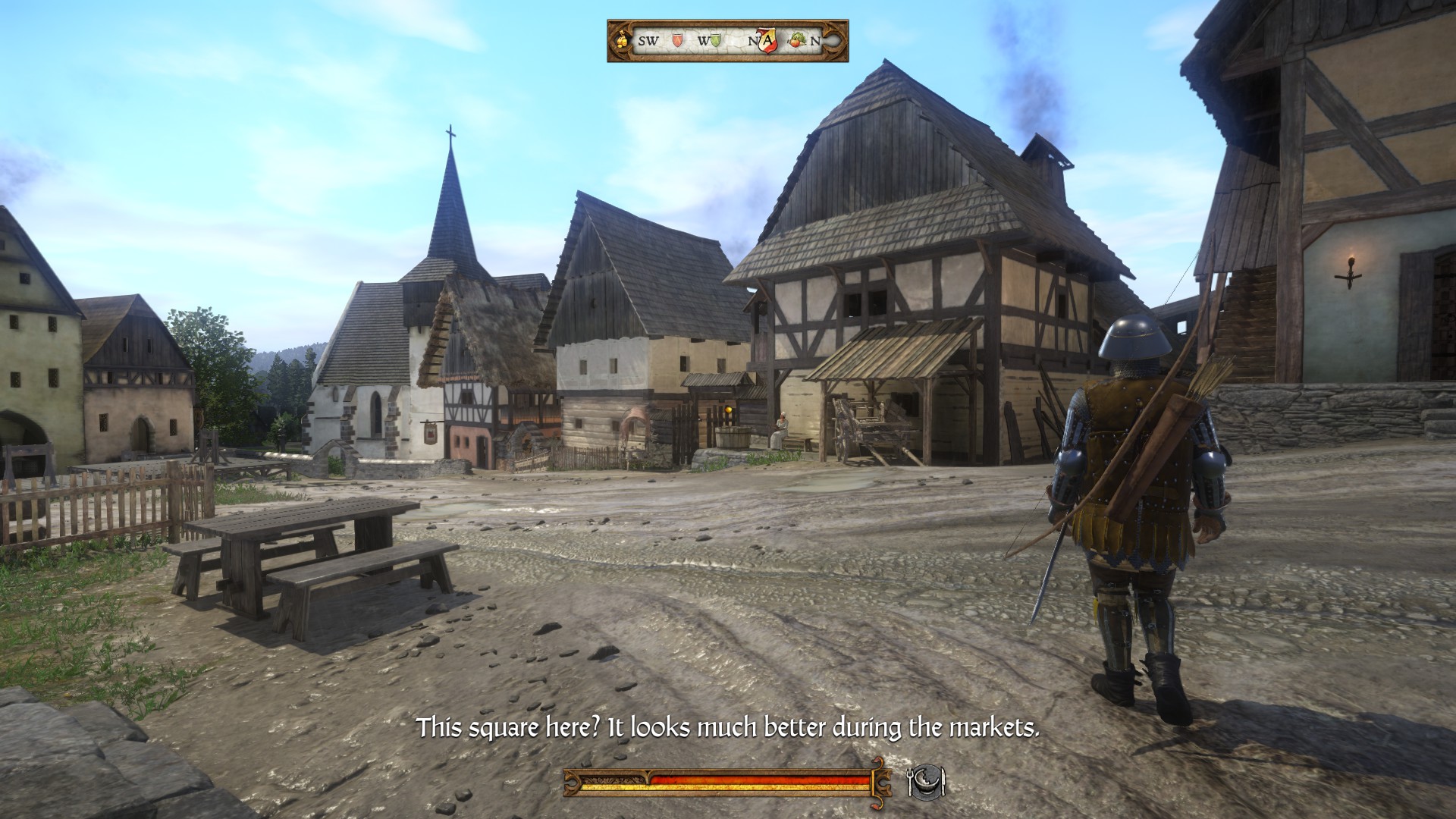
Deliverance's flexibility is admirable, but at some point you will have to contend with the combat system. This is one area where Deliverance prides itself on its authenticity, and certainly the detail is formidable. Combat is based on historical techniques, which are distilled into a system where you can attack from five different angles. Blocking is achieved by holding down a button, but the block will only protect your front. To stand any chance against the game's tougher opponents, you'll need to learn dodge, feint, parry strikes with timed blocks, and riposte to take advantage of their exposed position.
There are lots of elements to admire about the system. It takes into account the complexity of melee combat and how tricky it is to master. Fighting more than one opponent is extremely challenging, so if you're faced with multiple enemies, you're better off either running away, using a bow to shoot them from a distance, or attacking them on horseback. I also like how it takes into account medieval codes of honour. Both you and your enemies can surrender when losing. If your opponents drops to his knees, you can choose whether to let them go, pay some kind of ransom, or force them to fight on. Doing the latter will get you more loot, but it also may impact your honour.
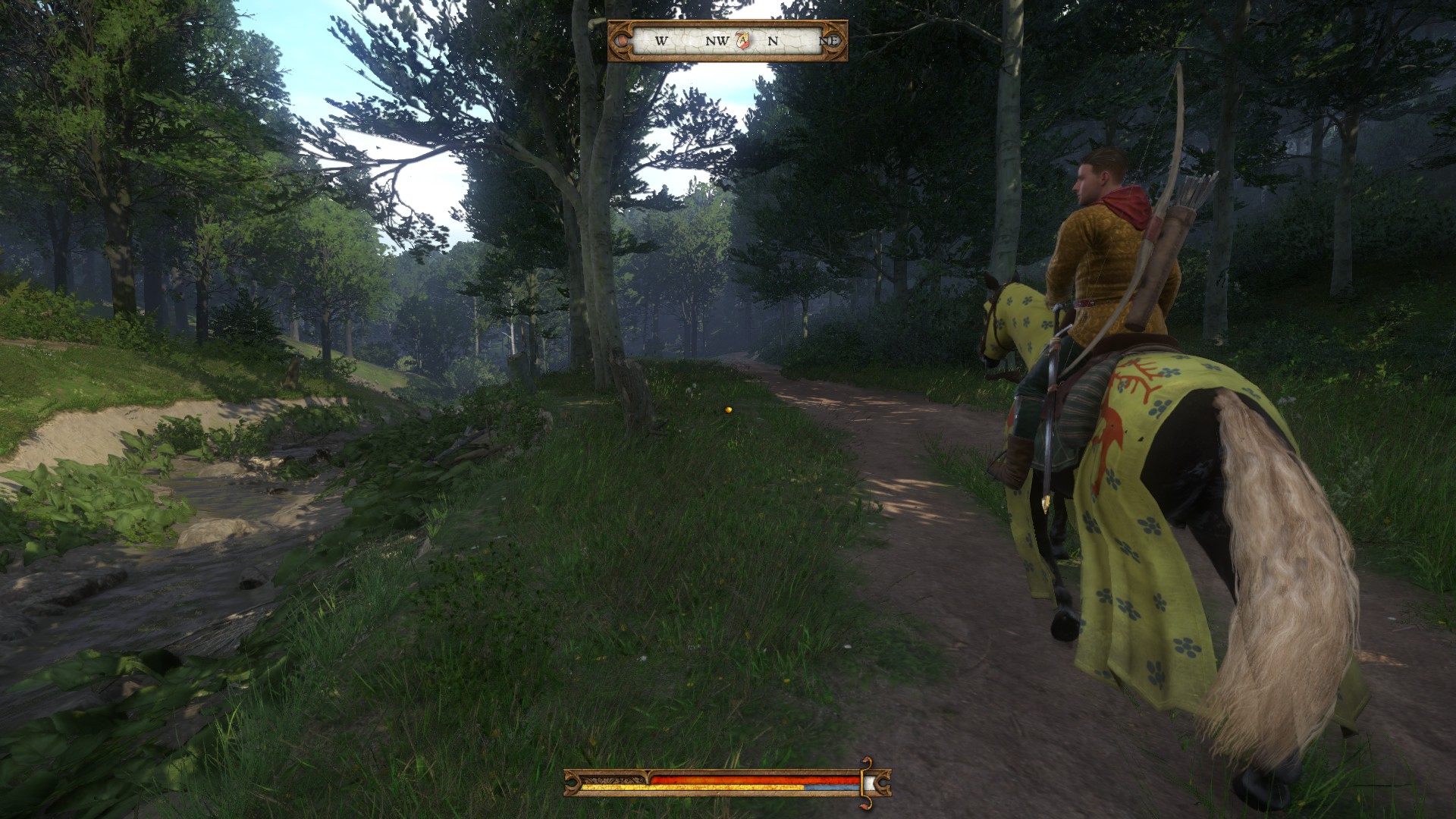
I love the idea on paper, but in practice there are some problems. Primarily, there's a disconnect between pressing the attack button and the way Henry swings the sword. He doesn't strike directly from a stance, instead bringing his arm back and then striking. Not only is this not how swordfighting works, it also means that timing your strikes appropriately is very difficult. The other issue is that Deliverance's main quest ups the ante of combat pretty rapidly but gives you no warning about the challenges that lie ahead. It's quite happy to let you walk into a fight you're not prepared for with no way of backing out other than to load a save from a good hour earlier.
The issues in the combat system are also indicative of Deliverance's wider problems. Although Deliverance's systems are rich and deep and detailed, they're also uneven and prone to bugs. Henry's movement has an unpleasant slippery quality to it, while his animations for interacting with the environment are slow and rough around the edges. Indeed, in terms of tactility, Deliverance reminds me a lot of Bohemia's ArmA games: stunning to look at but rather unwieldy beneath the fingers.
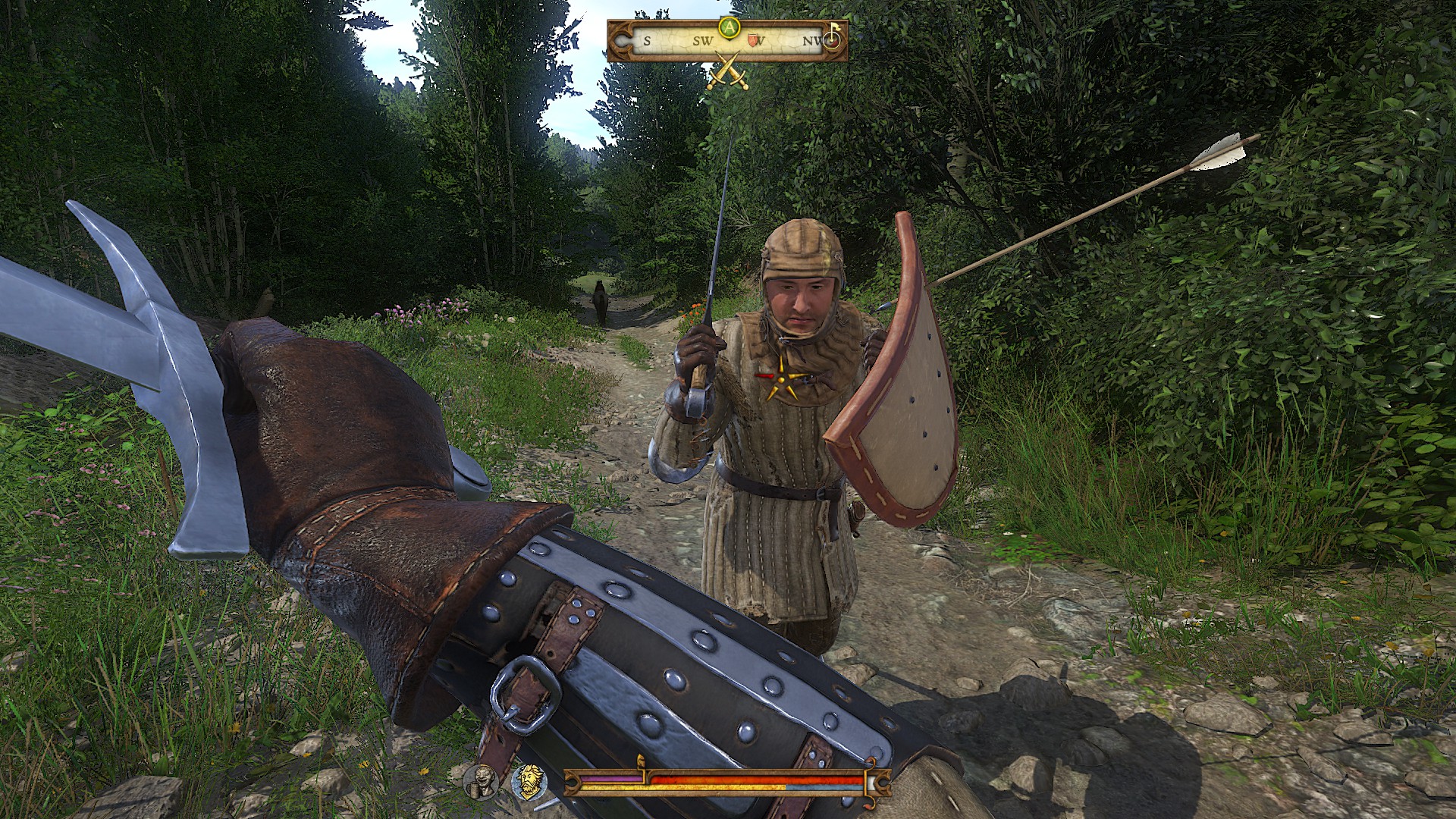
The rough feel of the game isn't the only issue. Deliverance is a pretty demanding game performance-wise, and on higher settings there is a lot of texture pop-in when either first loading the game or fast-travelling to a new area. Bugs are common, too. Most of them are minor, such as NPCs walking into you during a dialogue sequence with another character, but others are more serious, like conversations getting stuck on a seemingly endless loop.
Deliverance also devours time, and not just because of its vast scope. Doing virtually anything in the game is a time-consuming process. Some quests need you to wait until certain times of day, or several days, before you can move on. You can of course skip time, but your hunger and energy will deplete while doing so, forcing you to search for more food or a bed to sleep in. Conversations are often far longer than they need to be, and there are loading screens for every NPC interaction you have i.e. hundreds. Oh, and it uses an idiosyncratic save system whereby you have to buy or craft a specific item to save the game. This isn't quite as onerous as it sounds, as the game does autosave fairly regularly anyway, but it also doesn't add anything to the experience other than inconvenience.
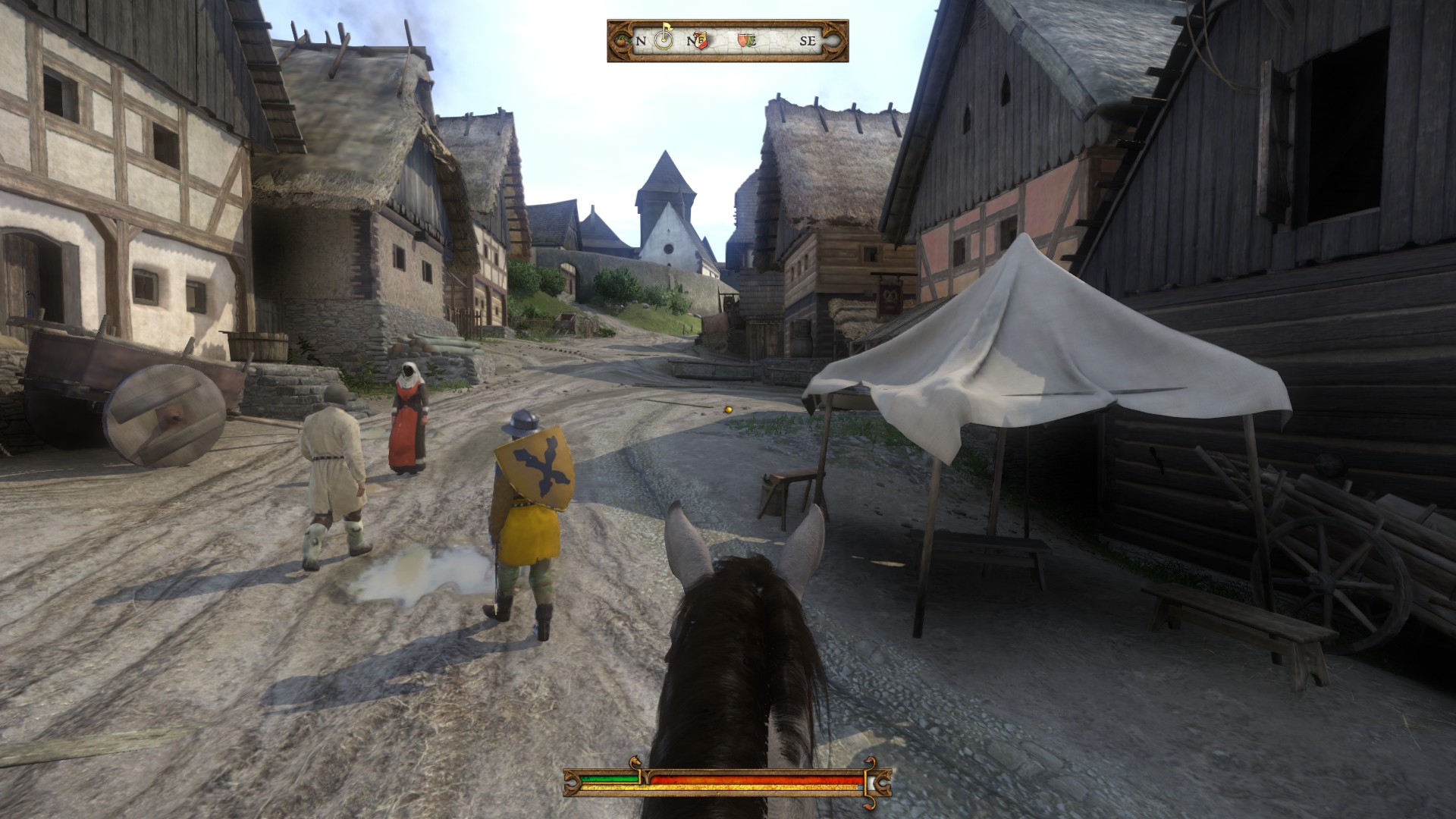
Beyond technical and mechanical problems, for a game that is so dedicated to simulating and representing the medieval era, it doesn't really explore the period in any meaningful way. Deliverance's interpretation of medieval history is a highly orthodox one, focussing mainly on the politics of the aristocracy and the mechanisms of war. Henry's position in the society, for example, is highly unusual, defying the boundaries of class like a prototypical Thomas Cromwell. Aside from a bit of lordly side-eye, however, Deliverance doesn't consider it in any great depth. Other hot topics of the day, such as the papal schism and the mounting fears over witches and heretics, are mainly used as frameworks for side-quests.
As for more revisionist historical issues, such as the role of women in medieval society and the cultural diversity of the region, a topic which has previously landed the developer in hot water, Deliverance basically refuses to comment. This isn't to say it is an outwardly racist or misogynistic game – you encounter many female characters in the game, most of whom are sympathetically drawn. But none of them trouble societal boundaries in the way that Henry does. There are no Joan d'Arcs, no Margaret of Anjous or Empress Matildas.
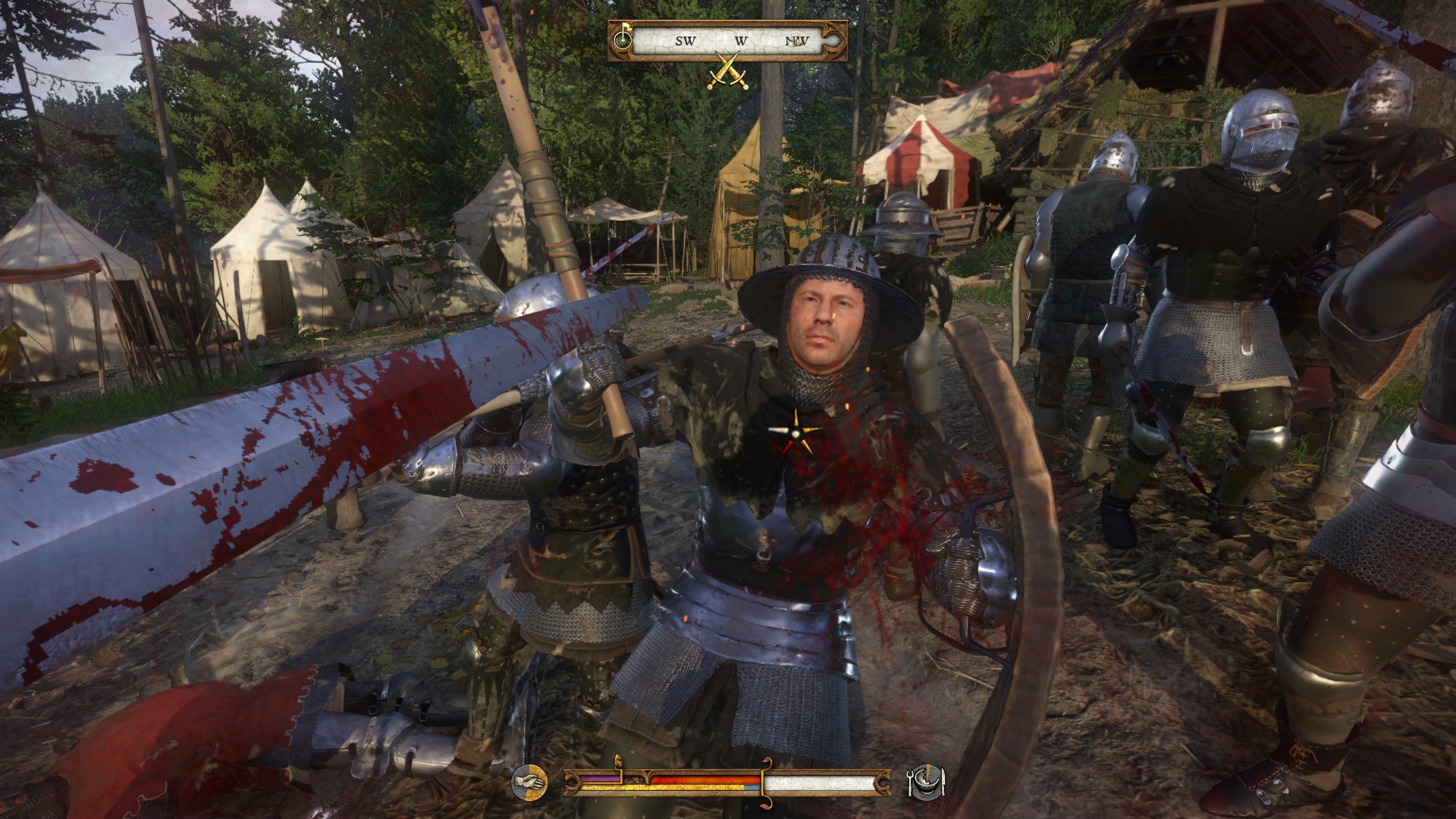
Compared to, say, The Witcher 3, which uses its medieval fantasy setting to really dig into issues of morality and race and its own social politics and to ask the question, 'Where is the line drawn between man and monster?', Deliverance basically goes, 'Here's a really detailed medieval world; go do medieval stuff!' There's nothing inherently wrong with this, but Deliverance's stated goal is to represent the medieval world in an authentic and historically accurate way, and it only commits to that goal where it suits.
For many people I'm sure this won't be a problem, and indeed it doesn't stop Deliverance from being an enjoyable experience. At the same time, however, it never made me sit back and think much about what was happening or what my character was doing in the same way that The Witcher 3, Mass Effect 2, Original Sin II, and many other great RPGs do. That, alongside the quality-of-life issues I mentioned, mean that while I recommend Kingdom Come: Deliverance, it doesn't quite do enough to challenge the RPG aristocracy.
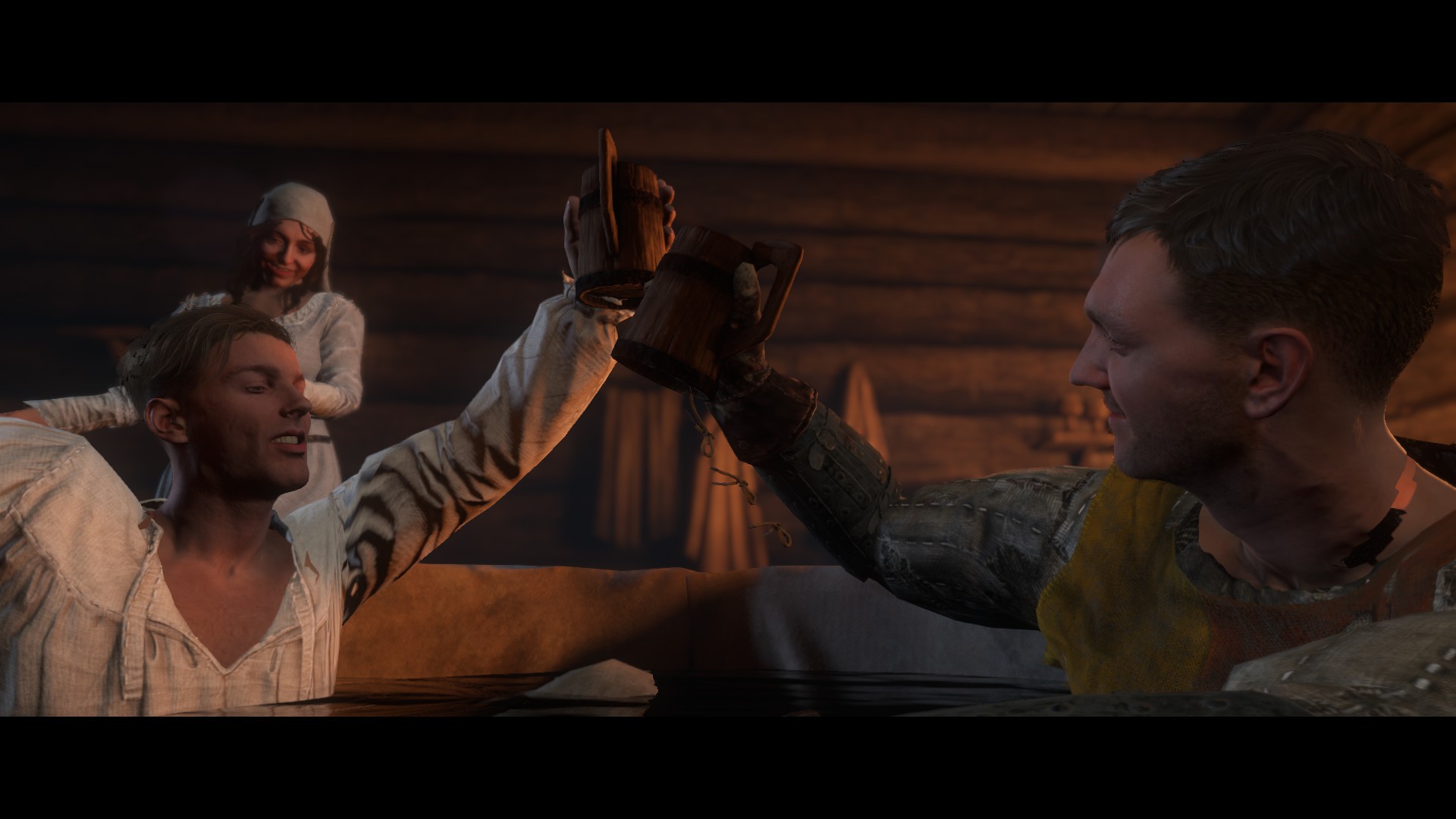


MSI MPG Velox 100R Chassis Review
October 14 2021 | 15:04

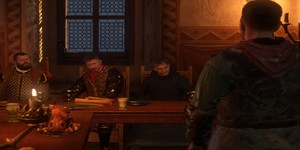
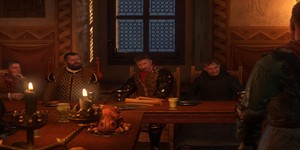






Want to comment? Please log in.